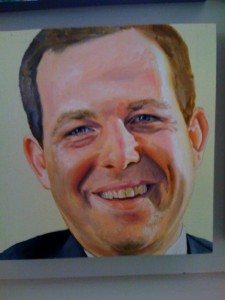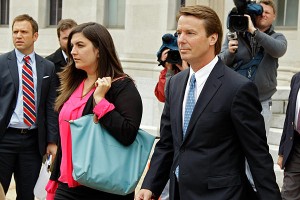By Greg Harris, on Tue May 15, 2012 at 10:00 AM ET  [Click here to follow the entire RP Debate] [Click here to follow the entire RP Debate]
It doesn’t take a decades old bullying incident to illuminate Mitt Romney’s views towards gays. His current public policy positions say enough. Mitt Romney believes that gay people are second class citizens.
Mitt Romney believes the humanity of gay citizens is not equal to the humanity of straight citizens. Otherwise, Mitt Romney wouldn’t advocate for denying the basic right for gay people who love one another to marry one another.
Mitt hails from a party that often claims government encroaches on religious liberty. But Mitt’s vision of government encroaches on my religious liberty. I am Jewish, and Reform (and Conservative) Judaism recognizes the rights of gay folks to get married. But under Mitt’s governing philosophy, the government would supersede the right of my faith community to recognize and sanction gay marriage.
Small government and individual liberty aren’t universal principles within the modern Republican Party. They only apply to those who were born the “right” way.
By Lisa Miller, on Tue May 15, 2012 at 9:45 AM ET  [Click here to follow the entire RP Debate] [Click here to follow the entire RP Debate]
While it’s true that Science reassures us that the human brain (and some decision making) isn’t mature until age 25, we’re not talking about the average citizen here. We’re discussing the past hate crime behavior of a person running for president of the United Sates of America.
The character of such a person can not, should not, be questionable. Character is developed over time, and, we’re discussing a hate crime.
For me, this is not about a lack of understanding/forgiveness for mistakes (Goodness knows I believe wholly and holy, that mistake making is essential for the growth of the human soul), but this is about choosing from a pool of leaders who have demonstrated, over a lifetime, qualities of honor and strong internal moral compass. We are not running low on a supply of those.
Should he be forgiven? If he is truly repentant from the heart and soul, yes! Should we consider instead OTHER candidates who don’t have hate crime backgrounds (for current and future races), yes! Should our standards and expectations come from a realm of excellence, yes!
One who runs and takes on office at this level should feel that personal honor is everything. And we should expect this. Who we are personally is who we are publicly, and vise versa.
Looking at the big picture here is key. Is this someone who demonstrates a genuine embracing of diversity?
We can elect leaders for whom this isn’t questionable. Our standards will set the standard.
By Artur Davis, on Tue May 15, 2012 at 9:30 AM ET  [Click here to follow the entire RP Debate] [Click here to follow the entire RP Debate]
I am in the camp that faults almost everything about this story: its timing–posting it the day after President Obama’s endorsement of gay marriage was a thinly veiled effort to link Romney’s opposition to a pattern of bigotry; its placement as a stand-alone piece when the details merited at best inclusion in a longer profile; its strained attempt at making nearly 50 year old events relevant; and its effort to exaggerate the perennial cruelties of adolescence into the systematic brand of bullying that we have become sensitized to today.
That a major newspaper got so many things so wrong is hard to justify as anything other than an agenda. Somewhere along the way, a major section of the press has absorbed the idea that Romney is a hollow kind of character without empathy or conviction, who has sold his soul to a hard-right clique in his party,and whose election would reverse the dawn of a new multi-cultural, tolerant America.
Having convinced itself that Romney is so flawed, much of that press has fed virtually every inspection of his record and past through such an unforgiving filter. The effect is that too much of the coverage of Romney looks exactly like the chain-letter attacks the DNC spits out every day.
Its one thing for a blogger or a columnist to develop a character thesis and dig away at it. Its another thing for an established press organ with a neutral face to go that route.
By Ronald J. Granieri, on Tue May 15, 2012 at 9:15 AM ET [Click here to follow the entire RP Debate]
My first impulse when I heard this story was, I admit, “Wow, what a spectacular piece off oppo research. Now Mitt Romney can be pigeonholed by people who were never going to vote for him anyway as both a gay-basher and the guy who strapped his dog to the roof of his car.”
[Recent self-serving protestations by the WaPo ombudsman aside, no one can deny that there were reasons why playing up particular aspects of this story made sense in the midst of our current debate.]
My second impulse, which I shared in a personal message to the RP, was “Having known some rich privileged [jerks] in high school I am not surprised to hear that rich, privileged Mitt Romney was a [jerk] in high school.”
Neither of those impulses, however, completely expresses my mature thoughts on the matter. Which gets back to the RP’s original point (and Steve’s) that there is a big difference between the impulsive acts of idiot teenagers and the (hopefully) mature positions of thoughtful adults.
Upon mature reflection, the story of Mitt Romney’s actions makes me feel a combination of anger, disgust, and sadness.
I attended an elite boys’ high school myself, though it was not a boarding school like Cranbrook, and I graduated high school exactly twenty years after Willard did. Things had changed somewhat in the intervening decades, and have changed even more since then. So the experiences are not identical, but they do rhyme: I saw and experienced the kind of casual sneering cruelty that adolescent boys can mete out to each other in a culture of macho preening and rigid social hierarchy. A few times I was on the direct receiving end of it, though most of the time I was a bystander.
Thankfully I never witnessed or experienced the kind of physical attack described in the recent newspaper accounts. Nevertheless, certain memories still bother me 25+ years later, and it is also true that I can never look at some of my former classmates (especially those now more active in public life) without at least some bitterness. If any of them were to be on a ballot, I would have a hard time voting for them. So I can understand that some of Romney’s classmates continue to have ambivalent feelings about him so many years after Cranbrook.
Does that mean that one’s behavior in high school reveals permanent and enduring elements of one’s character and should completely shape our view of the adult? God, I hope not. If we can credit other people with “evolving,” then we should all be able to accept that people can overcome the callow idiocy of youth and become more well-rounded and empathetic human beings.
But because we accept that people can learn from their youth and grow beyond it, we should expect, even demand, that when a public figure is confronted with questionable deeds and words from his/her past, that public figure will own the past and explain how it fits into the present. Complaining about the story’s publication is pointless at best, and pretending that the past does not matter is even worse. If Mitt Romney wants to run for president, and to make use of his personal history in his campaign, then he has to accept that the darker shades of his personal history will be discussed as well. The challenge for him, and for those who would defend him, is not to get lost in semi-denials and hemi-demi-apologies, but to own his past actions and explain how if at all they contribute to making him the man he is today.
Just as the history of nations includes both light and dark chapters, both of which need to be analyzed and understood honestly and completely, an honest assessment of a personal history should not try to evade unpleasant topics. It is Romney’s responsibility to address the past, and the responsibility of the rest of us to listen to his story and decide how to evaluate both the boy he was and the man he is. Forgetting is never the proper approach. Honest, even painful, remembrance of the past is the only way to build a better future.
By Steven Schulman, on Tue May 15, 2012 at 9:00 AM ET  [Click here to follow the entire RP Debate] [Click here to follow the entire RP Debate]
Well, I know *I* never would write and produce a song like that about Jimmy (much less memorize the lyrics and continue to sing it 25 years later). But we have all done things we regret as teens, particularly in groups.
So, given the commonality of this experience, why is it relevant to the presidential race?
The reaction to it by Romney is what is most relevant, and can give us some clues about how he views “the other.”
Ironically, for a person from an insular and sometimes persecuted minority, he does not seem to have much empathy for the “other” — particularly gay men and women. The last GOP administration suffered greatly from this kind of lack of empathy, and led us into some horrible human rights abuses against Muslims and those perceived to be different. Abu Ghraib and racial profiling at airports were only some of the more obvious symptoms, but that lack of empathy also contributed to the polarized atmosphere in Washington.
By Jonathan Miller, on Tue May 15, 2012 at 8:30 AM ET

The worst and most shameful thing I have ever done was as a teenager.
I was the ringleader of a group of friends that wrote, sang and produced a parody song about a younger kid with whom we attended camp. For purposes of privacy, I will call him Jimmy.
In those pre-autism, pre-Asberger days, Jimmy was simply considered strange, bereft of the many of the social and inter-personal skills shared by most teenagers. None of our gang ever made fun of him to his face, but in the conspiracy of a friend’s basement music studio, we sang about his perceived deficiencies to the tune of a then-popular song. At the time, it seemed brilliant and hilarious. And today, it reveals itself as unrelentingly cruel.
I console myself with the confidence that Jimmy never heard the cassette tape we recorded. (Thank God there was no Facebook). I don’t think he even heard about it. I also understand that my own episode of bullying was related to the extensive bullying I underwent in middle school — both physical and verbal — for my strange faith, my short stature, and my own personality issues.
But none of that excuses my behavior. I was wrong. I was awful.
I’ve been thinking a lot about Jimmy this week when I heard the story of Mitt Romney’s own episode of teenage bullying. If you’ve been on another planet in the past week, the press has been consumed with the story first reported by The Washington Post that Romney tackled and forcibly cut the hair of a fellow student who reveled in his nonconformity and was presumed gay.
In one sense, I am grateful that the story has been revealed. As I’ve written extensively at this site, I believe that gay rights is the most important civil rights issue of this generation, and anything that enables discussion of teenage bullying, and the horrible impact it has on gay children, is a positive development.
But while this discussion is important, I do not believe that the story is relevant for judging the character of Mitt Romney.
We all have done stupid and cruel things as teenagers. While my own episode did not involve violence, nor did it directly involve the victim, it was awful nonetheless. But I don’t think my character today is defined by that moment.
Indeed, science has demonstrated clearly over the past few decades that teenagers are wired much different that grown adults. Their brains are still developing, and they are prone to move more impulsive, emotional and destructive behavior.
For those of you who disagree with me — those who think that we should hold this 50-year-old incident against Romney — think about your own Jimmy story. I know you have one. We all do. The important thing is not what we did as a teenager, but whether or not we learned from it.
Romney’s record on gay rights and bullying as an adult must be carefully scrutinized. It is very much fair game.
But as much as I’m happy that the nation is focused again on the horrible crime of teenage bullying against gays and lesbians, I do not agree that any one should cast a vote against Romney because of this incident.
By John Y. Brown III, on Mon May 14, 2012 at 12:00 PM ET  My night as an outlaw. My night as an outlaw.
Some people aren’t good at being bad….but the important thing is to not focus so much on the mischievous act itself as much as on how loved ones should react–proportionately and appropriately.
I’m convinced that one of life’s most difficult to learn lessons is this timeless truth.
30 years ago while a freshman at Transy, I had a friend with two tickets for us to go to the Rolling Stones concert at Rupp Arena.
I also secured two last minute tickets myself. My friend asked what should we do and I said, “Let me handle this. I know what I’m doing.”
Arriving at the concert I overheard a gentlemen with a buzz haircut and wearing an army flak jacket asking about needing tickets. I offered two and named the price, $75.
He said, “I’m going to have to take your tickets and write you up a citation for ‘scalping tickets’ which is against the law in KY.” And he flashed his badge.
“Uhhhhh” I said.
And added, “Uhhhhh”
And finally, “Uhhhh” again.
 He took the concert tickets and my license and handed me a $52.50 citation and wished me well. My friend had bolted with my ticket and was enjoying the concert. I went to our car which was blocked in for the night. This was pre-cell phone days so I went to a phone booth and called my mother. He took the concert tickets and my license and handed me a $52.50 citation and wished me well. My friend had bolted with my ticket and was enjoying the concert. I went to our car which was blocked in for the night. This was pre-cell phone days so I went to a phone booth and called my mother.
“Some friends heard on the radio you’d gotten arrested for scalping tickets. Is that true?” She asked.
“I was cited. Not arrested! And I’m stuck without my car until after the concert. And they took the concert tickets too!” I responded.
“Well, as my friends said, it’s kinda funny and not that big a deal.”
That was my mom.
As for my dad, a few weeks later we had a family dinner and during the prayer before dinner my dad jokingly thanked the Lord that I was safe and not in prison. But added he was personally disappointed I only asked $75 per ticket when I could have gotten much more.
And finally, after dinner, my grandfather Brown, the renowned criminal lawyer age 81, offered to represent me pro bono and suggested we plead “temporary insanity.”
I was so relieved….and had learned my lesson.
The whole awful episode ended for me with my family supporting and laughing off what was a dumb thing to do–but not much more than that. Just a dumb kid being a dumb kid. But not being a “bad kid.”
And I’ll always be grateful for that.
By Jeff Smith, on Fri May 11, 2012 at 8:30 AM ET  As a former state senator who served prison time for lying about a campaign finance violation involving approximately $10,000, I unfortunately have a unique perspective on the imbroglio surrounding former Sen. John Edwards, D-N.C. — a case in which campaign finance law, selective prosecution, and budget priorities in a time of scarcity happen to intersect. As a former state senator who served prison time for lying about a campaign finance violation involving approximately $10,000, I unfortunately have a unique perspective on the imbroglio surrounding former Sen. John Edwards, D-N.C. — a case in which campaign finance law, selective prosecution, and budget priorities in a time of scarcity happen to intersect.
The media attention surrounding my own guilty plea, resignation and prison sentence was extremely painful. Yet it was nothing compared with the widespread ridicule Edwards has received. His public image is ruined, and he faces a real possibility of prison. Even so, prison is not an appropriate punishment for someone who conceals an affair.
 Edwards is now being prosecuted in federal court because one of his campaign backers pitched in to support his mistress and their love child, at a time when the public was unaware he had either. To the layman’s eye, such payments may not look like campaign contributions at all, let alone illegal ones. But according to prosecutors, they helped Edwards’ 2008 presidential campaign by concealing his infidelity and preserving his public image as a devoted family man. Edwards is now being prosecuted in federal court because one of his campaign backers pitched in to support his mistress and their love child, at a time when the public was unaware he had either. To the layman’s eye, such payments may not look like campaign contributions at all, let alone illegal ones. But according to prosecutors, they helped Edwards’ 2008 presidential campaign by concealing his infidelity and preserving his public image as a devoted family man.
Read the rest of…
Jeff Smith: The Wasteful, Adrenaline-filled Case against John Edwards
By Artur Davis, on Thu May 10, 2012 at 8:30 AM ET Quin Hilyer of the Center for Individual Freedom published an article about Artur Davis’ rise as a proponent for ballot integrity:
 A new right-leaning star was born last weekend at the True the Vote summit in Houston, while the dynamo who heads True the Vote simultaneously achieved multiple goals related to ballot integrity. For a single 24-hour conference to achieve so much is remarkable, and deserves more attention than one meager column, alas, can give it. But let’s try. A new right-leaning star was born last weekend at the True the Vote summit in Houston, while the dynamo who heads True the Vote simultaneously achieved multiple goals related to ballot integrity. For a single 24-hour conference to achieve so much is remarkable, and deserves more attention than one meager column, alas, can give it. But let’s try.
First, what is True the Vote? Despite leftist propaganda to the effect that it is some sort of partisan (or even racial) attempt at vote suppression, True the Vote is a growing, bipartisan, multi-racial, national movement to ensure that elections are conducted with integrity and without polling-place antagonism. The idea is to place and train poll watchers, as per existing law, in every precinct in the country – so they will know exactly what they can and can’t do to stop and report voting irregularities without causing a stir that could in any way intimidate, much less suppress, legitimate voters….
But the surprising star of the show, according to many observers including this one, was former Rep. Artur Davis, the Alabama Democrat who gave one of the key nominating speeches for Barack Obama at the 2008 Democratic National Convention. In recent months, Davis has written numerous times for the conservative National Review, and he strenuously opposed ObamaCare while in Congress, so it was already clear that on at least some issues he leans right of center. It was already known that he supported voter-ID laws: Last October 17 he wrote a column in the Montgomery Advertiser saying as much. Of fraudulently manufactured votes, he wrote then, “If you doubt it exists, I don’t; I’ve heard the peddlers of these ballots brag about it, I’ve been asked to provide the funds for it, and I am confident it has changed at least a few close local election results.”
But that was child’s play compared to the tour de force of a speech he made last weekend. Holding up a photo-ID, he ridiculed those who say it is too great a burden to require one – especially those who have said such a requirement is a violation of civil rights and human dignity.
“This is not a billy club,” he said, recalling violent civil rights battles of the past. “This is not a fire hose…. This is not Jim Crow…. My parents and my grandparents can tell you what a colored-only water fountain tasted like. They could tell you what a colored-only bathroom smelled like.” It certainly, he said, was nothing like his ID card: “this tiny little thing that doesn’t wound, that has no sharp edges.” And: “To call photo ID a degradation of human rights is not only something that is so fundamentally wrong, but is something my parents would not even recognize…. That [claim that ID requirements violate human rights] is the old tactic of telling us the very opposite of what it true.”
Also blasting the establishment media for waking up in tony enclaves and driving to offices in prime real estate while telling the rest of us that we are out of touch with America, Davis lumped those media folks together with the political ruling class that willingly looks away from (or tacitly condones) vote fraud. “You cannot let the insiders run this game,” he thundered.
Click here to read the full piece.
By Artur Davis, on Thu May 3, 2012 at 10:00 AM ET  Washington is a city that loves to see itself on the television screen. Unlike New York or Los Angeles, neither of which is parochial or insecure enough to revel in the attention, the capital loves any affirmation of its glamour; it still takes quiet offense at the barb that it is Hollywood for powerful people who are simultaneously ugly and dull. So, it is no surprise that ABC’s late season series “Scandal”, which tries hard to inject some wit and sexiness into the conventional account of political tawdriness and cover-up, is buzz-worthy in certain sectors of the District. It helps that the show breaks genuine historic ground at the same time. Washington is a city that loves to see itself on the television screen. Unlike New York or Los Angeles, neither of which is parochial or insecure enough to revel in the attention, the capital loves any affirmation of its glamour; it still takes quiet offense at the barb that it is Hollywood for powerful people who are simultaneously ugly and dull. So, it is no surprise that ABC’s late season series “Scandal”, which tries hard to inject some wit and sexiness into the conventional account of political tawdriness and cover-up, is buzz-worthy in certain sectors of the District. It helps that the show breaks genuine historic ground at the same time.
Most descriptions of “Scandal” have rightly accentuated the ground-breaking part: the casting of an African American woman (Kerry Washington as Olivia Pope) in the starring role in a drama is a development that has not happened either since Diahann Carroll appeared in “Julia”, or, perhaps, since Regina Taylor shared the lead role in the underrated and elegant “I’ll Fly Away”. (At this rate, a ten year old black girl will have her moment by the time I turn 65). It’s a weird—make it maddening, inexcusable thing—that there is still history to be made in the choice to cast a black woman in the lead, but it is unmistakable boldness on ABC’s part. Only three times in the life of our culture has a “big 4” television network trusted a black woman in an up-front role without a laugh track, and ABC to its credit ups the ante by rendering a narrative that has next to nothing to do with race or reimagining the culture of discrimination: no small thing in an industry that still makes movies about maids.
 Olivia Pope is no sacrificing, modest victim of limitations. She is a stylish, equally lionized and feared practitioner of crisis management, which in the mythology of “Scandal”, is the business of burying the secrets of the high and mighty. (as to the impressionable among you, be advised that the real-life version of the profession has more to do with debunking corporate whistleblowers, spinning CEO demotions, and messaging sudden stock deflation). If you are the kind of viewer who catches the stray details in dialogue, it seems that Pope is a Republican—albeit, the moderate, feminist, non Tea Party loving kind. She was an instrumental member of the campaign team that elected the incumbent president, with whom she also shared a bed in between strategy sessions (a disclosure that was only slyly alluded to in the series trailer and which in a more intricate plot might have been late season cliff-hanger material, but which was offered up much too promptly within the opening hour). Olivia Pope is no sacrificing, modest victim of limitations. She is a stylish, equally lionized and feared practitioner of crisis management, which in the mythology of “Scandal”, is the business of burying the secrets of the high and mighty. (as to the impressionable among you, be advised that the real-life version of the profession has more to do with debunking corporate whistleblowers, spinning CEO demotions, and messaging sudden stock deflation). If you are the kind of viewer who catches the stray details in dialogue, it seems that Pope is a Republican—albeit, the moderate, feminist, non Tea Party loving kind. She was an instrumental member of the campaign team that elected the incumbent president, with whom she also shared a bed in between strategy sessions (a disclosure that was only slyly alluded to in the series trailer and which in a more intricate plot might have been late season cliff-hanger material, but which was offered up much too promptly within the opening hour).
Read the rest of…
Artur Davis: ABC’s “Scandal”: The Bland & The Beautiful
|
The Recovering Politician Bookstore
|
 [Click here to follow the entire RP Debate]
[Click here to follow the entire RP Debate]
















